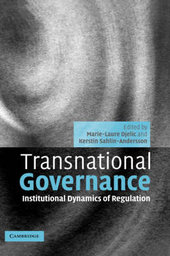
|
Transnational Governance: Institutional Dynamics of Regulation
Hardback
Main Details
| Title |
Transnational Governance: Institutional Dynamics of Regulation
|
| Authors and Contributors |
Edited by Marie-Laure Djelic
|
|
Edited by Kerstin Sahlin-Andersson
|
| Physical Properties |
| Format:Hardback | | Pages:488 | | Dimensions(mm): Height 229,Width 152 |
|
| ISBN/Barcode |
9780521845038
|
| Classifications | Dewey:320.01 |
|---|
| Audience | | Professional & Vocational | |
|---|
| Illustrations |
17 Tables, unspecified
|
|
Publishing Details |
| Publisher |
Cambridge University Press
|
| Imprint |
Cambridge University Press
|
| Publication Date |
10 August 2006 |
| Publication Country |
United Kingdom
|
Description
Globalization involves a profound re-ordering of our world with the proliferation everywhere of rules and transnational modes of governance. This book examines how this governance is formed, changes and stabilizes. Building on a rich and varied set of empirical cases, it explores transnational rules and regulations and the organizing, discursive and monitoring activities that frame, sustain and reproduce them. Beginning from an understanding of the powerful structuring forces that embed and form the context of transnational regulatory activities, the book scrutinizes the actors involved, how they are organized, how they interact and how they transform themselves to adapt to this new regulatory landscape. A powerful analysis of the modes and logics of transnational rule-making and rule-monitoring closes the book. This authoritative resource offers ideal reading for all academic researchers and graduate students of governance and regulation.
Author Biography
Marie-Laure Djelic is Professor of Management at ESSEC Business School, Paris. Kerstin Sahlin-Andersson is Professor of Management at Uppsala University, Sweden.
ReviewsFrom the hardback review: 'National regimes which have long held sway over most arenas of political, economic, and social life are being supplemented and challenged by the rise of a multitude of transnational institutions. This welcome volume by an international group of scholars explores where, how and by whom these influential new governance systems are being constructed.' W. Richard Scott, Professor Emeritus, Stanford University From the hardback review: 'Karl Polanyi argued sixty years ago that the development of national capitalism required increasing levels of regulation. Transnational Governance shows impressively that the same thing is happening today at the international level. With the rise of globalization, nation-states, NGOs, central bankers, multinational corporations, and others are developing a host of new international modes of regulation and governance. This insightful volume will be of great interest to sociologists, political scientists, and organization.' John L. Campbell, Class of 1925 Professor, Dartmouth College, and Professor of Political Economy, Copenhagen Business School From the hardback review: 'From a world society perspective and with a rich set of case studies this intriguing volume traces how transnational governance is emerging as a vital field of innovative scholarship and a vigorous domain of regulatory politics.' Peter J. Katzenstein, Walter S. Carpenter, Jr. Professor of International Studies, Cornell University From the hardback review: 'Rule making has exploded everywhere. National boundaries and institutions are challenged by transnational networks of agents creating new norms of governance. World level organizations increasingly reorder traditional regulatory patterns and communities of expert practice, and the distinction between managerial and regulatory action is no longer clear. In this collection, Djelic and Sahlin-Andersson have assembled an all star-cast to explore these different facets of the explosion in transnational regulation.' Michael Power, Professor of Accounting and a Director of the ESRC Centre for the Analysis of Risk and Regulations (CARR), London School of Economics From the hardback review: 'The contributors to this book increase by a dimension our knowledge and understanding of the sheer complexity and restlessness of the institutions, processes, actors and cultures that are shaping transnational governance.' British Journal of Industrial Relations
|